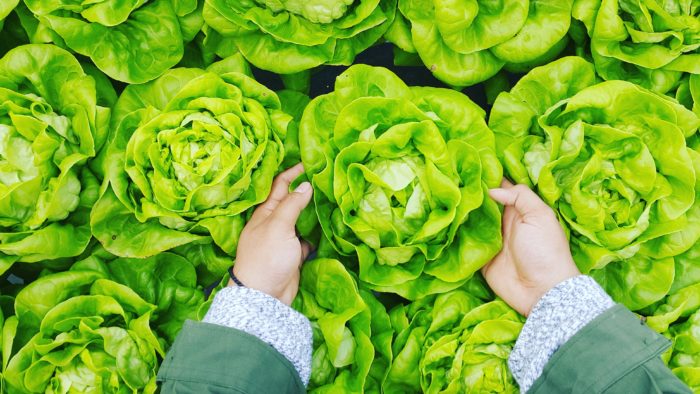Food sensitivity testing is promoted as a tool that can help you determine what foods your body is reacting negatively to. These companies claim that you can then just remove those foods from your diet and start feeling better. Simple as that.
But is that really how it works? Should you take a food sensitivity test? And are the results helpful in improving your health, or might they serve as a roadblock to complete healing?
In this blog post, I’m going to dive into the facts and the science behind food sensitivity testing.
My goal is to provide you with information to make an informed decision about food sensitivity testing. That way you’ll know whether or not it can play a role in your pursuit of optimal health.
There are so many tools available to us that promise deeper insight into our bodies. That having this insight will help us make better choices to get us quickly on the path to healing.
And, yes, some of these tools are valuable and worthwhile to invest your money, time, and effort in.
But often times the information these tools give us can actually serve as a sticking point. One that keeps us from using intuition to guide our choices.
And unfortunately, this is the main downfall of food sensitivity testing.
Don’t get me wrong, food sensitivity testing can be useful in certain circumstances.
But, more often than not, I’ve seen women develop a fear of food and slip back into disordered eating tendencies after taking a food sensitivity test.
In this blog post, I’ll share the truth behind food sensitivity testing. My hope is that this will help you make the right decisions for you in your pursuit of a healthy, fearless life.
Ready to learn more? Let’s go!
Food Sensitivity vs Food Allergy
Before we dive into the specifics about food sensitivity testing, I want to clarify one important point.
Food sensitivities and food allergies are NOT the same.
There’s a distinct difference between these two “diagnoses” that affect how you move forward.

Food Allergies
Food allergies can be serious and life-threatening responses that require life-long avoidance of the trigger food.
Allergies, whether they’re to food or to pollen, elicit an immune response. This allergic immune response makes itself known by increasing the production of something called Immunoglobulin E (IgE) antibodies.
Immunoglobulins, in general, are a critical piece to the immune system. These molecules recognize and bind to specific antigens.
Antigens can be anything from a bacteria or virus, to a certain food that causes an immune response and the release of antibodies (another name for immunoglobulins).
There are a variety of different classes of immunoglobulins (IgA, IgD, IgE, etc.). And each of these classes reacts to different stimuli and produce different symptoms in susceptible individuals.
IgE, or allergic, reactions typically show up immediately after consumption of the trigger food. They’re often characterized by hives, swelling, wheezing, vomiting, or a runny nose.
The most common foods that elicit an IgE mediated response are peanuts, shellfish, eggs, dairy, soy, tree nuts, and wheat.

Food Sensitivities
Food sensitivities, on the other hand, are a bit more complex.
Reactions to foods you’re sensitive to, while the symptoms can be unpleasant, usually aren’t as severe as allergies and can be reversed.
Food sensitivity reactions also are not mediated by an IgE response. This is the main factor that differentiates food sensitivities from food allergies.
Sensitivities to certain foods are, more often than not, related to the health of your gut.
Intestinal permeability, or leaky gut, is a condition where the cells of your intestines are no longer joined together properly. This allows large molecules like bacteria or undigested food particles to pass into your bloodstream.
And when undigested food particles escape your intestines, you can experience symptoms associated with food sensitivity.
Leaky gut can be a result of a variety of factors such as:
Symptoms of being sensitive to a certain food often show up days or weeks after consuming that food. This is why it can be difficult to pinpoint exactly what foods are causing a reaction.
Common symptoms of food sensitivity are gas, bloating, reflux, acne, fatigue, and headaches.

What is Food Sensitivity Testing?
So now that we understand the difference between food allergies and food sensitivities, we can take a deeper dive into food sensitivity testing.
Food sensitivity testing is advertised as a simple way to determine the foods that your body is reacting negatively to. Once those foods are identified via a blood test, you can remove them from your diet and start clearing up your symptoms.
Companies that offer food sensitivity testing claim that by testing for the presence of IgG antibodies, you can determine what foods your body is sensitive to.
IgG antibodies are similar to, but not the same as the IgE antibodies produced in an allergic response. (Spoiler alert, most research suggests IgG antibodies actually have nothing to do with food sensitivities!)
Results of food sensitivity testing often include a sliding scale. One that goes from not sensitive to very sensitive, depending on how many antibodies you create to each of the foods tested.
These results are then used to tailor your diet to remove the foods that you tested most sensitive to. It’s thought that once these offending foods are removed your symptoms should disappear as well.
Food sensitivity testing, at first glance, seems like a great way to identify and remove foods that are causing symptoms. But, like with many tools available to us claiming to improve our health, there’s more to the story.
Keep reading to learn the reasons why I don’t recommend food sensitivity testing.

Why I Don’t Recommend Food Sensitivity Testing
I’m not a fan of food sensitivity testing for a variety of reasons.
This doesn’t mean that I’m not in support of identifying trigger foods, eliminating symptoms, and healing your gut.
Figuring out what foods are causing your symptoms and being able to remove them and start feeling better is so important.
And being able to have freedom and spontaneity around food is a key component to living a healthy, vibrant life. When eating makes you feel sick and miserable, we need to get to the bottom of why you’re feeling that way.
But I don’t believe that you need to rely on test results to do that.
Here are a few reasons why I don’t recommend food sensitivity testing.

It’s Not a Robust Science
The claims that IgG reactions can point to food sensitivities just isn’t backed by science.
When IgG antibodies are present in your blood, this can actually suggest food tolerance, not intolerance as many food sensitivity companies may have you believe.
One study looked at a population of children who had sensitivities to eggs and milk. The results showed that those who had higher levels of IgG antibodies to eggs and milk actually became tolerant of these foods later in life.
Plus, eating a certain food often can actually increase the presence of IgG antibodies to that food.
This is mainly considered a harmless immune response to the consumption of food. And is often why the foods that you eat most frequently show up as the foods you’re most sensitive to.
(In other words, an IgG food sensitivity test may just be showing you what foods you’re eating most frequently!)
Diagnosing food sensitivities based on IgG reactions has been studied. And the results show that this marker is an unreliable and not clinically relevant strategy for determining food sensitivities.
Yes, having a significant level of IgG antibodies in your blood could indicate that you have a leaky gut. But there is no research to back up the idea that IgG antibodies can determine which foods need to be removed from your diet in order to feel better.

Raw vs Cooked Food
Another downfall of the science (or lack thereof) behind food sensitivity testing is that these tests typically don’t distinguish between raw and cooked foods.
Cooking foods changes the structure of the proteins. This, in turn, changes their capacity for provoking an immune response.
In order to get a completely accurate assessment of each food and how you respond to them, you would need to get tested for both the cooked and raw versions.
But most often, the lab that is doing your food sensitivity testing is only looking at the food in it’s raw OR it’s cooked state.
This can lead to the possibility of inaccurate results.
So even if IgG testing was an accurate method for determining food sensitivities, you could be removing foods that you don’t actually react to, and continuing to eat ones that are causing symptoms.

A DISTRACTION From Getting to the Root Cause
Food sensitivity testing focuses primarily on symptom reduction. And don’t get me wrong, reducing symptoms and being able to eat with freedom is important for both your physical and mental wellbeing.
But focusing too heavily on reducing symptoms can be a distraction. One that keeps you from getting to the root of why you’re reacting to foods in the first place.
Determining the root cause of your food sensitivities is, in the long run, so much more beneficial than just determining the foods you’re sensitive to.
Today’s culture tells us that instant gratification is no longer a luxury but the norm. So choosing to dig into the “why” behind your symptoms instead of just treating the symptoms themselves can feel counterintuitive.
But trust me, health that enables you to pursue your greater purpose in life isn’t tied down to food restrictions and limited diets. You don’t have to live a life constantly in fear of food and how it will make you feel.
By getting to the root of why you need to avoid foods, you can get to a place where limiting and restricting food is a thing of the past.
And yes, this will take more work on your part. Healing the root cause is usually not a quick and simple process. But I’ve seen so many women find true healing and freedom by taking this approach.
Determining your food sensitivities can be one step on the road to healing. But it’s not the final step.
Don’t let feeling better on a restricted diet keep you from striving to find full health on a diet that is guided by only your desires, not fear of symptoms.
Would you like to save this post?
Your email address is 100% safe and will never be sent spam.

TESTING Can Trigger Food Fear and Disordered Eating
If you have a history of fear around food and disordered eating, you should stay far away from food sensitivity testing.
Assigning yourself a list of foods that some lab says you can and cannot eat is a recipe for falling back into old (or new) disordered habits.
Most labs present foods you’re “sensitive” to with a red dot or a red bar. And no matter how much you’ve researched and dug into the validity of these tests, the red mark next to that food is hard to ignore.
Once you have the data in hand, it’s hard to make yourself believe that this food truly isn’t behind your symptoms.
Plus, most food sensitivity test results come back with a hefty list of foods that need to be avoided in order to achieve better health.
Trying to figure out how to eliminate more than a handful of foods from your diet would stress anyone out. Not to mention how it might affect women who already have a history of food fear and disordered eating.
Food is not the enemy. And unfortunately, food sensitivity tests often make food a source of fear and anxiety.
My goal for every woman is to experience food freedom and learn personalized, intuitive eating. Because I know how physically, mentally, and spiritually draining it can be to be bound by the chains of food fear.
And when a piece of paper is dictating what you eat and how you view food, that’s a major problem. Especially if that piece of paper may be completely inaccurate!
And if you’ve dealt with food restriction and disordered eating patterns in the past, you shouldn’t be using food sensitivity testing unless under the guidance of a well-trained practitioner.

It Takes Away Your Ability to Eat Intuitively
In my opinion, intuitive eating is one of the major pillars of true health.
Being able to eat what you want, and knowing exactly what your body needs, is the best way to truly nourish your body. And once you learn to properly nourish your body, you’re better able to nourish yourself in other areas as well.
You’ll not only find freedom around food, but freedom in your relationships, your mindset, and your body image. And more!
And unfortunately, this is the freedom that food sensitivity testing takes away. By giving us a list of “good” foods and “bad” foods, we’re no longer eating as is guided by our intuition.
We’re becoming slaves to the test results. Results that may or may not align with our own intuition around these foods.
I’ve seen so many clients who come to me confused over the results of their food sensitivity tests. So often the foods that are listed as being most highly reactive are the ones that they had been eating and enjoying the most.
And they’re typically not the foods that these women intuitively thought might be causing symptoms and already eliminated from their diets using personal experience.
Remember the unreliable science behind food sensitivity testing: The foods you consume most frequently have a greater chance of being the ones that will show up as highly reactive on your test results.
So, when it comes to determining food sensitivities, I recommend letting yourself be guided by your intuition and personal experience over the results of a lab test. (It also helps to have an objective coach/practitioner helping guide you through this process!)

What I Recommend Instead of Food Sensitivity Testing
Just because I don’t recommend food sensitivity testing doesn’t mean that I think food sensitivities don’t exist.
Food sensitivities are real.
But there are better, more accurate methods for determining what foods you’re reacting to besides relying on a questionable lab test.
Here are a few tried and true methods for figuring out what foods you may be reacting to. No fancy, expensive, or misleading lab testing required!

Keep and Food and Symptom Journal
Tracking your food and associated symptoms can be a pain. It can also potentially be a trigger for anyone who has previously restricted food or counted calories/macros.
But tracking food and symptoms is one of the best methods for determining what foods you’re reacting to and which ones you’re not.
And if you’re able to approach tracking your food and symptoms from a perspective of self-improvement and love, not restriction and fear, this can be a valuable tool.
I’d recommend keeping a food journal for a period of a few weeks. Remember, food sensitivities can show up a few days after actually consuming the food in question. Matching symptoms with foods might not happen right away, but with time, you’ll be able to see patterns develop.
Food sensitivities can also be dose-dependent. As an example, eating a quarter cup of broccoli might not cause a reaction. But eating half or a full cup (or more) could result in symptoms. That’s why tracking approximately how much you’re eating of each food is helpful as well.
And if just thinking about tracking your food is stressing you out, don’t worry. There are other ways to successfully determine what foods you’re reacting to.
If you think you might be triggered by keeping such a close eye on what you’re eating, don’t do it. Using this method is not worth the potential mental and emotional side effects.
But if you are able to pinpoint some foods that are causing symptoms, try removing them for a period of time while you work on healing your gut or identifying any other root causes.
You shouldn’t need to remove these foods forever. Finding what foods affect you is just the first step on the path to vibrant health without food restriction. And avoiding those foods is often just a short-term step on your journey to healing.

Try an Elimination Diet
If tracking your food intake and symptoms doesn’t work for you, an appropriate elimination diet could be a great option.
Elimination diets are considered the gold standard for determining food sensitivities.
These short-term diets involve removing foods that you suspect are causing symptoms, or are known to commonly cause symptoms. Once symptoms have resolved, you’ll then reintroduce each food one at a time in an attempt to find the food that was triggering your symptoms.
During the reintroduction period, you’ll need to be on the lookout for reactions and recurrence of symptoms. And because reactions can take a few days to show up, reintroducing only one food every 3-5 days is ideal.
Once you have successfully identified a food that causes your symptoms, you can remove it from your diet. But don’t plan on necessarily removing this food forever.
Elimination diets are just the first step in uncovering the root of your food sensitivities. Removing the offending foods can give you some relief while you work to determine why you’re reacting to those foods in the first place.
Common Foods to Remove
Elimination diets can be as complicated or as simple as you want them to be. Either way, it’s not worth sacrificing your mental health or relationship with food just to determine a reactive food a little bit sooner.
I don’t recommend eliminating more than a few foods from your diet at once. This not only can trigger an unhealthy relationship with food, but it can make having a healthy social life and spontaneity around food difficult. And a massive list of “don’t eat” foods can cause accidental undereating, which alone can trigger your symptoms.
With that being said, here is a list of some common foods that are typically removed on an elimination diet:
- Gluten
- Grains
- Dairy
- Eggs
- Nuts and seeds
- Legumes and peanuts
- Soy
- Nightshades (tomatoes, peppers, eggplant, white potatoes)
- Fish
- Beverages like coffee, alcohol, and soda
- FODMAP-containing foods
- Processed sugar
This is not an all-inclusive list. If you suspect that another food is behind your symptoms, you’ll want to spend a period of time without that food in your diet as well.
Again, I don’t recommend removing all of these foods all at once. And if this seems overwhelming, that’s normal. Trying to navigate an elimination diet, while you’re not feeling your best is a difficult task.
Working with someone who has experience walking people through elimination diets can only improve your chances for success.
And remember, removing foods is not the end goal. Elimination diets are only a tool to help you get to the root of why you need to eliminate foods in the first place.
For more information on how to successfully complete an elimination diet, listen to this podcast Kelsey Kinney and I recorded on the topic.

Find the Root Cause of Your Symptoms
The only way to truly heal a food sensitivity is to get to figure out why you’re reacting negatively to that food in the first place.
Simply removing a food can help resolve your symptoms. But it typically cannot heal the underlying reason why you’re having symptoms.
(Unless your symptoms are caused by something like untreated celiac disease, which will often resolve with the removal of all gluten.)
And if you haven’t addressed the root cause, attempts to eat that food again in the future will likely result in recurrence of those unpleasant symptoms.
Long-term restrictive diets can be detrimental to your physical health as well as your mental and emotional relationship with food and your body.
Food sensitivities can be a result of a variety of gut conditions. Anything from leaky gut to a bacterial overgrowth can cause symptoms when you eat certain foods.
Working with a medical professional who can analyze stool testing, SIBO breath testing, blood work, or even a hormone panel can help you get to the root cause of your symptoms.
I’ve worked with so many clients who, once they started addressing the results of these tests, were able to go back to eating a diet with minimal restrictions.
Getting to the root cause can take more time and persistence. But fixing the underlying issue is so worth the freedom that eating without restriction can bring!

My Food Sensitivity Testing Recommendation
Once our brains have decided that food is a problem, we can get stuck in fearful avoidance no matter what our personal experience tells us. It then becomes harder to follow our intuition with our food choices.
Don’t get me wrong, food sensitivity testing can be beneficial in some situations.
But focusing on nourishing your body with foods you can consume rather than stressing over the ones you “can’t have” will go a long way in your quest for true health.
If you do think that food sensitivity testing is the best option for improving your health, there is one test out there that might be a better choice.
Of all the tests available, I feel most comfortable with the Cyrex Array 10 Multiple Food Immune Reactivity Screen. Compared to other food sensitivity tests on the market, this is one is the most reliable.
But even then, it’ll never give you 100% accurate results. That’s why I rarely (if ever) suggest a client should invest hundreds of dollars in this testing option.
The most accurate way to determine foods you’re sensitive to is use elimination diets and symptom journaling.
Plus, these methods can help you get in tune with your body in so many more ways than just determining food sensitivities.
It’s a practice that takes practice and conscious effort. But if you’re experiencing symptoms from certain foods, this is the best way to get back on the path to feeling your best.
And if you’re struggling with determining what foods you may be sensitive to, I can help!
Click here to sign up for a strategy session with me. We can dive deeper into your food journals, work on developing a healthy mindset around food, and get you on a protocol that will help you eat those restricted foods again soon.
Do you have any experience with food sensitivity testing? Have these tests been helpful or harmful on your healing journey? Share your thoughts in the comments below!
This post may contain affiliate links. If you click on a link and make a purchase, I may receive a small commission.

+ show Comments
- Hide Comments
add a comment